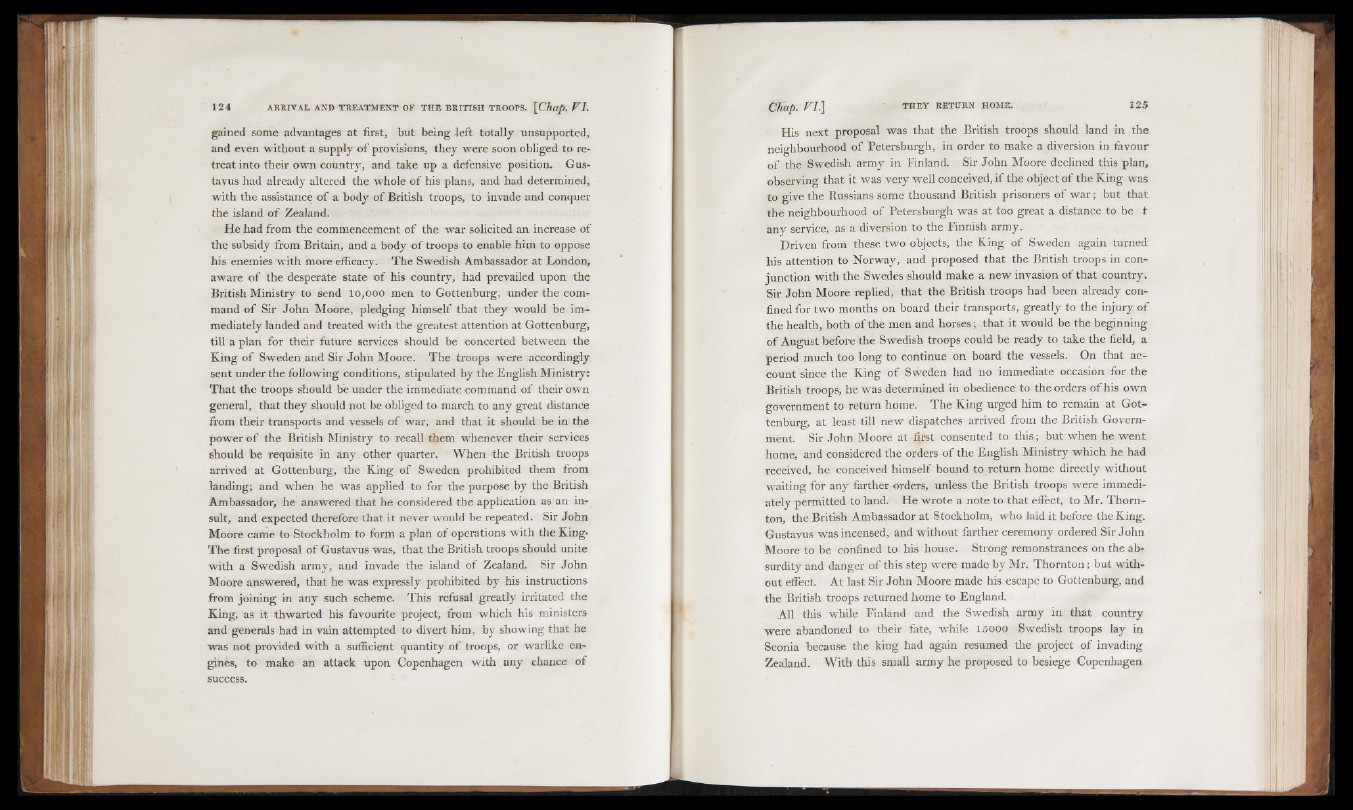
gained some advantages at first, but being left totally unsupported,
and even without a supply o f provisions, they were soon obliged to retreat
into their own country, and take up a defensive position. Gustavus
had already altered the whole of his plans, and had determined,
with the assistance o f a body of British troops, to invade and conquer
the island of Zealand.
He had from the commencement of the war solicited an increase of
the subsidy from Britain, and a body of troops to enable him to oppose
his enemies with more efficacy. The Swedish Ambassador at London,
aware of the desperate state 'of his country, had prevailed upon the
British Ministry to send 10,000 men to Gottenburg, under the command
o f Sir John Moore, pledging himself that they would be immediately
landed and treated with the greatest attention at Gottenburg,
till a plan for their future services should be concerted between the
King of Sweden.and Sir John Moore. The troops were accordingly
sent under the following conditions, stipulated by the English Ministry:
That the troops should be under the immediate command of their own
general, that they should not be obliged to march to any great distance
from their transports and vessels of war, and that it should be in the
power o f the British Ministry to recall them whenever their services
should be requisite in any other quarter. When the British troops
arrived at Gottenburg, the King of Sweden prohibited them from
landing; and when he was applied to for the purpose by the British
Ambassador, he answered that he considered the application as an insult,
and expected therefore that it never would be repeated. Sir John
Moore came to Stockholm to form a plan of operations with the King*
The first proposal o f Gustavus was, that the British troops should unite
with a Swedish army, and invade the island of Zealand. Sir John
Moore answered, that he was expressly prohibited by his instructions
from joining in any such scheme. This refusal greatly irritated the
King, as it thwarted his favourite project, from which his ministers
and generals had in vain attempted to divert him, by showing that he
was not provided with a sufficient quantity of troops, or warlike engines,
to make an attack upon Copenhagen with any chance of
success.
His next proposal was that the British troops should land in the
neighbourhood of Petersburgh, in order to make a diversion in favour
o f the Swedish army in Finland. Sir John Moore declined this plan,
observing that it was very well conceived, if the object of the King was
to give the Russians some thousand British prisoners of w a r ; but that
the neighbourhood o f Petersburgh was at too great a distance to be f
any service, as a diversion to the Finnish army.
Driven from these two objects, the King of Sweden again turned
his attention to Norway, and proposed that the British troops in conjunction
with the Swedes should make a new invasion of that country.
Sir John Moore replied, that the British troops had been already confined
for two months on board their transports, greatly to the injury of
the health, both of the men and horses; that it would be the beginning
of August before the Swedish troops could be ready to take the field, a
period much too long to continue on board the vessels. On that account
since the King of Sweden had no immediate occasion for the
British troops, he was determined in obedience to the orders of his own
government to return home. The King urged him to remain at Gottenburg,
at least till new dispatches arrived from the British Government.
Sir John Moore at first consented to this; but when he went
home, and considered the orders of the English Ministry which he had
received, he conceived himself bound to return home directly without
waiting for any farther orders, unless the British troops were immediately
permitted to land. He wrote a note to that effect, to Mr. Thornton
the British Ambassador at Stockholm, who laid it before the King.
Gustavus was incensed, and without farther ceremony ordered Sir John
Moore to be confined to his house. Strong remonstrances on the absurdity
and danger o f this step were made by Mr. Thornton; but without
effect. At last Sir John Moore made his escape to Gottenburg, and
the British troops returned home to England.
All this while Finland and the Swedish army in that country
were abandoned to their fate, while 15000 Swedish troops lay in
Sconia because the king had again resumed the project o f invading
Zealand. With this small army he proposed to besiege Copenhagen